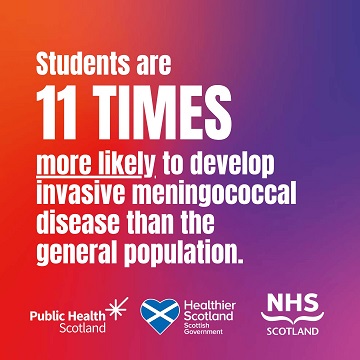Getting vaccinated
It's really important to check you're fully vaccinated against infectious diseases before starting at Edinburgh Napier, as these can spread easily in university communities. The free vaccines offered by NHS Scotland will help protect you and other students around you.

What vaccinations should I get?
The most important vaccines to get are for:
- Measles, mumps and rubella (MMR)
- Meningitis ACWY
- Human papillomavirus (HPV)
Vaccines are offered for free by NHS Scotland. If you've moved to Scotland from overseas, you may be eligible for additional vaccines that were not available where you lived previously.
To find out how you can get these vaccines, as well as any others you may be eligible for, visit the NHS Inform website.
Vaccines and spotting symptoms
Measles, mumps and rubella (MMR)
The MMR vaccine helps to protect babies against measles, mumps and rubella. It is sometimes also offered to adults who missed their childhood immunisations.
Measles, mumps and rubella are highly infectious diseases that can leave children suffering serious medical complications. However, the high number of people getting the MMR vaccine in Scotland means there's been a big reduction in the number of people catching these diseases.
Getting the vaccine
The MMR vaccine is a safe and effective combined vaccine that protects against the three separate illnesses in a single injection. The full course of the vaccination requires two doses and should be given at least four weeks apart.
It is likely that you will have received one MMR immunisation as a baby or a child, but it is advised to check with your GP before arriving at University if both doses have been administered.
If you have not received the MMR vaccine before leaving for University, you can register with a new GP practice once you arrive and arrange to get the vaccine here as soon as possible.
Spotting the common signs of measles:
-
a high temperature of 38 °C or more
-
a rash on the skin that usually first appears on the head/neck and then spreads to the rest of the body
-
cold-like symptoms
-
sore, red eyes that may be sensitive to light
Meningitis ACWY
Meningitis and septicaemia (blood poisoning) are rare but life-threatening diseases. They are caused by several groups of meningococcal bacteria, the most common being A, B, C, W and Y. Young people have the highest risk of contracting meningococcal disease, as well as children and babies.
The meningococcal ACWY (MenACWY) vaccine helps protect against meningitis and septicaemia. Students starting University for the first time are at an increased risk of MenACWY disease because they are more likely to stay in halls of residence and have more close contact with new students, particularly during the first few weeks of term.
It is important that you are immunised at least two weeks before you attend University to make sure your immunity has fully built up.
If you did not get immunised before leaving for University, you can register with a new GP practice once you arrive and arrange to get the vaccine as soon as possible.
If you are postgraduate and have any queries about meningitis and septicaemia you should speak with your GP.
Spotting the common signs of meningitis:
- a blotchy rash which doesn't fade when a glass is rolled over it
- a high temperature
- being sick
- a stiff neck
- severe headache
HPV
Most students will have had the HPV vaccine at school. If you missed it, you may still be eligible for the vaccine.
If you are a student (from Scotland or from overseas) and have not been offered the vaccine, you first need to register with a GP practice local to your new address.
You'll be eligible for the HPV vaccine if:
- You were assigned female at birth and are under 25
- You were assigned male at birth and started secondary school during or after the 2019/2020 school year
- You were assigned male at birth, have sex with men (MSM), and are aged up to and including 45 years old
Men who have sex with men are offered the vaccine because they're known to have a higher risk of HPV infection due to not being protected by the girls' HPV programme.
Covid-19
Some students who have a weakened immune system or certain eligible health conditions may be offered the coronavirus vaccine.
